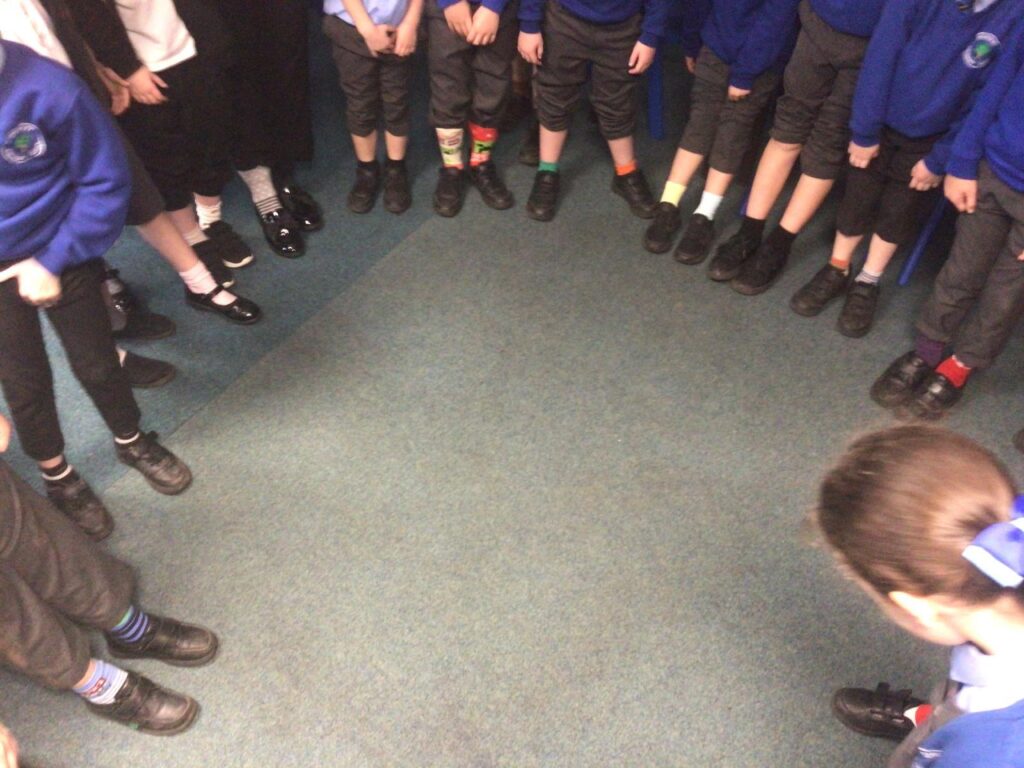Anti Bullying
Bullying Hurts! No one deserves to be a victim of bullying. Everyone has a right to be treated with respect. Children, young people and adults who are bullying need to learn different ways of behaving. Our Positive Behaviour Policy outlines our expectations of all children’s behaviour, consequences for not meeting these expectations as well as our stages of consequence. It is the responsibility of all adults working at Sherdley to model desired behaviour and recognise pupils’ successes. We work in partnership with our parents and carers in helping their children to behave well and to make good choices. We know that our children are individuals with unique experiences and lives which vary from day to day. We understand how these positive and negative experiences may present themselves through behaviour. (Positive Behaviour Policy) Everyone within our Sherdley Family has a responsibility to respond promptly and effectively to issues of bullying.
As a school, we realise the impact and increase in online bullying. We deliver a rigorous PSHE and computing curriculum to our children and take part in Internet Safety Day annually. Staff are trained in the most up to date online bullying training, this also includes radicalisation through the Prevent strategy. More information can be found about this in our Anti-Bullying Policies and Computing Policies.
Each year, we take part in the annual ‘Wear Odd Socks’ for Anti Bullying Week.
Support for Parents / Carers
It’s not easy when your child is going through a bullying situation, but we are here to help.
Signs that might mean your child is being bullied: Any change in behaviour (louder, quieter, angrier, sadder). Being scared to go to school or take part in their usual activities. Unexplained illness like tummy bugs and headaches, Disturbed sleep, Bedwetting, Injuries, Distress after using phones or tablets, lost or stolen belongings
Don’t panic. It is horrible if you suspect your child is being bullied, but you will get through this with the right support. Stay calm and reassure your child that together you will sort this out. Create space to talk It is important to create time and space for your child to talk to you. Sometimes a direct question works, but other times it may be helpful to go for a walk, a drive or out for food together and gently ask how they are feeling about life and school. Listen carefully and watch their body language for signs that they might have more to share. Keep creating opportunities until they’re ready to talk. Remember your child will want to protect you, so it may be that they are more willing to open up to other family and friends. This is very normal and it’s worth thinking about who else they might be willing to speak to.
Reassure. If your child tells you that they are being bullied, let them know this is not their fault, that they can get through this, and together you will sort it out.
Record. Make a note of what has happened where, with who, for how long, and the impact it has had on your child. School can help you and your child do this. Ask your child what they need. Ask them how the bullying situation is making them feel, and what they most need from you and the people around them. It’s important your child feels in control of the situation. They may be worried about telling others (e.g. being called a snitch), so work out the best action together.
In school. If the bullying is happening in school, it is vital that you let the staff team know what is happening and the impact it is having on your child. The focus should be on making sure the bullying stops and that your child gets the support they need. In some instances, the bullying behaviour may also constitute a crime and you can contact the police on 101 in a non-emergency, or 999 in an emergency. Online If the bullying is online, the majority of social media platforms have an acceptable use policy, and you can report incidents. If the perpetrators are from your child’s school, the school should take action to address their behaviour. In some instances, the bullying behaviour, whether face-to-face and/or online, may also constitute a crime and you can contact the police on 101 in a non-emergency, or 999 in an emergency.
Take a look at Kidscape pages on Cyberbullying and digital safety for more advice if your child is being bullied online. https://www.kidscape.org.uk/
In the Community. The local authority has a duty to keep your child safe from harm. If you are worried about the safety of your child, contact your local children’s services team. Consider who else can help. your child needs support at this time, so help them think about other people who can help them. This may be other children or teachers they like and trust. Encourage them to take part in activities that make them feel good about themselves and have friendships outside of school.
Talk to your GP If the bullying has impacted on your child’s physical or mental health (e.g. they are very scared or anxious) talk to your GP. Your GP may make a referral to Child and Adolescent Mental Health services for support. You may also want to consider sourcing your own counselling support, and you can do this through the British Association for Counselling and Psychotherapy (BACP).
Things to avoid:
Dismissing their experience. Dismissing their experience as “just growing up” or telling them to just ignore it won’t make the bullying stop.
Telling your child to hit back. It is very common to hear parents say they tell their child to hit back if someone has hit them, but we would not give this advice to an adult who is hit in the street or in the workplace, so why do we expect children to have to physically defend themselves? Your child may get more hurt, and it also makes it hard for school staff to know who started the fight, so you may find that it’s your child who is punished.
Getting angry. It is natural to feel angry and upset if your child is being bullied, but taking this out on school staff or other parents won’t stop the bullying. Stay calm so that you can get the help you need for the bullying to stop.
At Sherdley we have a Graduated Approach to Supporting our children and families.
Stage 1: Class Teacher and Year Group Team
Stage 2: Key Stage Leads: Mrs Roberts EYFS, Mrs Fleming KS1, Mr Hughes LKS2, Miss James UKS2.
Stage 3: Assistant Head: Mrs Stroud / Mr Davies
Stage 4: Deputy Head: Mrs Bennett
Stage 5: Head: Mr Gawne
Celebrating our uniqueness by wearing ‘Odd Socks’ to launch Anti-bullying week.


